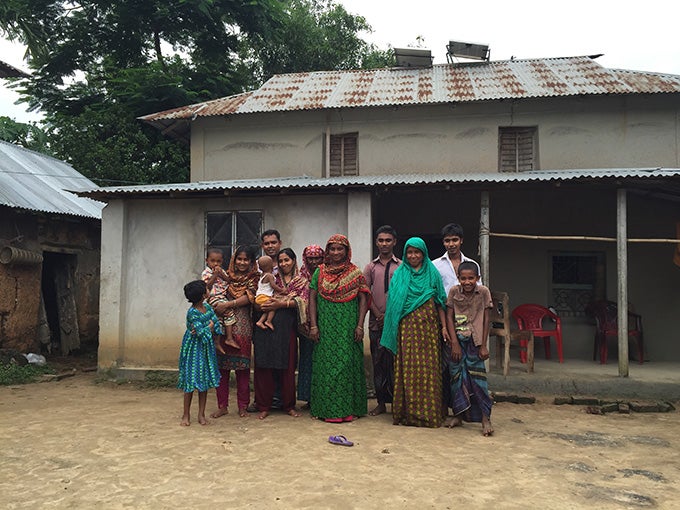Night falls in Dhaka. Commercial streets glow with lights and the neon-lit stores and restaurants are abuzz with shoppers enjoying a break from Ramadan. This is a great visual spectacle punctuated by the incessant honking of colorful rickshaws.
But the reality is different right outside the capital. Sunset brings life to a halt in rural areas as about 60 percent of rural households do not have access to grid electricity. Kerosene lamps and battery-powered torches are widespread yet limited alternatives, their dim light offering limited options for cooking, reading or doing homework.
It is a sweltering hot day when our team sets out to visit a household of 14 in the village of Pachua, a two-hour drive from Dhaka. Around 80% of the villagers have benefited from the solar panel systems to access electricity. The Rural Electrification and Renewable Energy Development Project (RERED), supports installation of solar home systems and aims to increase access to clean energy in rural Bangladesh.
We’re accompanied by Nazmul Haque Faisal from IDCOL, a government-owned financing institution, which implements the program. “This is the fastest-growing solar home system in the world,” Faisal says enthusiastically, “and with 40,000-50,000 new installations per month, the project is in high demand.”
We’ve now reached our destination and Monjil Mian welcomes us to his house, which he shares with 13 other members of his family, including his brothers, two of them currently away for extended work stints in Saudi Arabia.

The family purchased their first solar panel 8 years ago and added a second one later on. The closest electricity grid system is 4 km away. “We used to live in the dark” Monjil says and “we had to go to the nearest village, 4.5 km from here to recharge our mobile phones and torch lamps. It was a waste of time and money and we had to pay 10 takas for each device.”
I ask how the solar panels improved their lives. Safety is a main concern for the family. One advantage of the solar system is that it can store energy in a rechargeable battery and a household can operate 3-4 lights and a television set for at least 4 hours a day—or later during the night. The family switches on their backyard light as soon as the sun sets to repel thieves and burglars from entering their property. Talking about safety, the old smoky kerosene lamps were also a hazard interjects Nasima, Monjil’s sister in law, and she recounts the story of villagers whose mosquito nets caught on fire in pre-electricity days.
The conversation turns to the remittances sent from Saudi Arabia by Monjil’s brothers. Their money has helped pay for the solar system and the family uses mobile banking to complete financial transfers. The whole process is now much easier and can be done at home on the fully-charged phones, thus sparing the family a trip to the nearest village.
Nasima’s son, Monirul, fetches the family’s latest acquisition, a brand new laptop. He’s an 11th grade student at the local school and uses the computer for increasing his typing skills. “I read, and write, and practice my typing” he says. “Before we had the solar panels, everything was blurry because the light was so dim.” Nasima adds that she wants to start using Skype to communicate with her husband, who comes back home from Saudi Arabia every other year. They used to write each other letters and it took one week for them to be delivered.
It’s now the end of the day and my iPhone battery is almost dead, a universal annoyance. Monirul is proud to fix as he plugs my charger into one of the house’s electrical sockets.
While my phone is enjoying its first ever solar-generated replenishment, we cross the backyard to pay a visit to Lal Mian. An administrator at the local high school, who looks forward to the benefits of electricity in his home. “Darkness will go away,” he said, “and we can move around the house and the property at night.” Looking at his two nephews, he adds: “their lives will improve and they will have the opportunity to study.




Join the Conversation